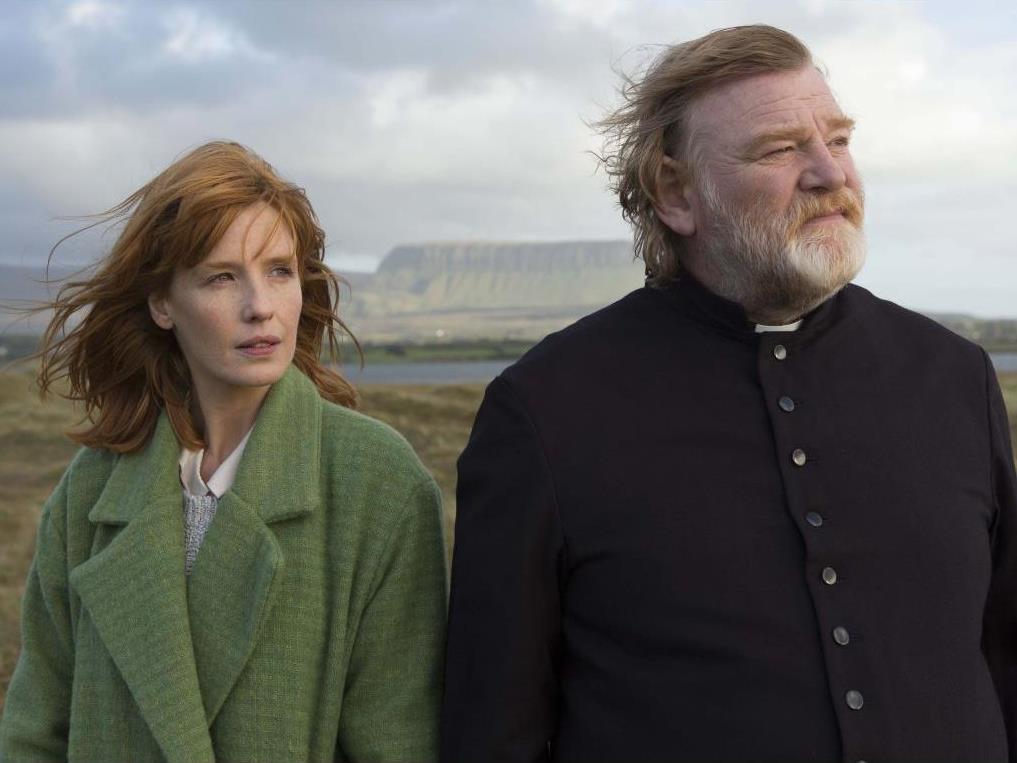The weight of Catholicism weighs heavily upon writer/director John Michael McDonagh’s second film – both the burden of believing, and the uncertainty of forging a secular path. In Calvary, the name of the biblical site haunts the titular Irish coastal town that becomes a beacon for all that’s welcomed and disapproved of in organized religion, each sat side by side in an effort that presents the complexity but doesn’t pass judgment. That its central character is a priest struggling with a parishioner scarred by the sins of his brethren, yet remains devoted to his community and his late-in-life calling, perhaps best summarises the thread of enquiry and observation that underscores the feature’s premise.
In the safety of the confessional booth, Father James Lavelle (Brendan Gleeson, Edge of Tomorrow) hears a man tell a story of sexual abuse, and of his planned retribution – not against the perpetrator, but against the innocent source of his supposedly sought after solace. In a week from Sunday on the beach, the Father is told his life will come to an end. As the days pass by, his potential impending downfall bears on his mind; however even if his time on Earth might be winding down, the problems of the community – and of his visiting suicidal daughter (Kelly Reilly, Chinese Puzzle) – still need his attention.
As each of the townsfolk is introduced – the imperious fellow priest (David Wilmot, Anna Karenina), the butcher with wife woes (Chris O’Dowd, Cuban Fury), the wealthy but detached former financier (Dylan Moran, Good Vibrations), the sarcastic doctor (Aiden Gillen, TV’s Game of Thrones), the lonely young man looking for love (Killian Scott, Love/Hate), and the condemned prisoner (Domhnall Gleeson, Frank) among them – Calvary plays out as a series of darkly comic two-handed conversations, pitting each troubled soul against the Father and all that he represents. This structure may seem slight, but is misleadingly so in terms of the effectiveness and impact of each scene. It is in the existential discussion more than the film’s modest action of feuds and fires that its themes and emotions ripple and resonate.
Of course, much rests on the excellent ensemble cast in such sequences, as led by the ever-excellent elder Gleeson. Again taking centre stage for McDonagh after the astute and entertaining The Guard, his presence is quietly commanding, infused with the weariness of wading through the same issues over and over, and with the acceptance that all things, good and bad, come to an end. Playing against type, the trio of O’Dowd, Moran and the young Gleeson add shades of contrast to the priest’s cautious calm, impudent, aloof and mournful in turn. As the father-daughter relationship with Reilly unravels, she sees delicacy and softness sweeten the many shades of suffering – and always with a sense of humour.
In compositions courtesy of cinematographer Larry Smith (Only God Forgives), lushly lensed wide shots of the scenic locale sit amid the precise framing of each and every chat, again emphasizing notions of the collective and the intimate that sit at the heart of the film. The picturesque visuals add to the feature’s chief dichotomy, of the appearance of richness and the flawed reality it often hides. Laced with the absurd and amusing, this juxtaposition is offered with sincerity and a sombre gaze, as is the entirety of the often caustic but never cynical effort. Satirical and serious as well as fatalistic and thoughtful, Calvary is a musing and moving meditation on faith, served up with dark comedy and deft commentary.
Rating: 4 out of 5 stars
Calvary
Director: John Michael McDonaghUK / Ireland, 2014, 100 mins
Sydney Film Festival
www.sff.org.au
4 – 15 June
In general release: July 3
Distributor: Transmission
Classification: TBC
Actors:
Director:
Format:
Country:
Release:





